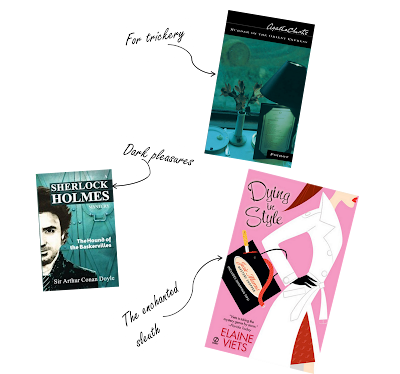A good mystery novel, a blanket, and a couch by the window (not in a cemetery!)are all I need to enjoy an evening at home. Once I've devoured Murder on the Midnight Express, I can choose from The Hound of the Baskervilles, or for a chic, lighter read, I might go for Dying in Style. Mysteries these days range from the gruesome and truly scary to intriquing and even cozy.

Mysteries usually open with the death or threat to a character.
Then the story moves along as plot events are unfolded. Plot events are steps that
characters take to reach short or long-term goals. In a mystery the plot event
could be the discovery of a clue.
Atmosphere is also important in a mystery, so creating an
ominous or sinister atmosphere with eerie word choices is a good start. Also, keep
the readers guessing by leaving a little mystery around the characters’
motivation to either kill or to solve the crime.
Hard-boiled mysteries are very cool in that the reader is
told very little about the character’s thoughts or emotions. The story is
almost subjective except at key moments. There is a downside to writing in this
style: it’s hard to keep the viewpoint. Once the viewpoint is lost, the reader
may also lose interest.
Numerous subplots give mysteries their quality, so keep up
the character study and intrigue!
Crime plots are usually regarded from one person’s point of
view, this isn’t the case every time, but as the general rule goes here are
some points of view you should consider when writing your next big mystery:
Plot
|
Point of View
|
Murder Mystery
|
Master Detective
|
Caper
|
Criminal
|
Detective
|
Cop
|
Gangster
|
Crook
|
Thriller/revenge
|
Victim
|
Courtroom
|
Attorney
|
Newspaper
|
Reporter
|
Espionage
|
Spy
|
Prison Drama
|
Inmate
|



No comments:
Post a Comment